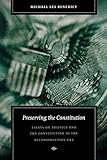Preserving the Constitution : Essays on Politics and the Constitution in the Reconstruction Era / Michael Les Benedict.
Material type: TextSeries: Reconstructing AmericaPublisher: New York, NY : Fordham University Press, [2022]Copyright date: ©2006Description: 1 online resource (316 p.)Content type:
TextSeries: Reconstructing AmericaPublisher: New York, NY : Fordham University Press, [2022]Copyright date: ©2006Description: 1 online resource (316 p.)Content type: - 9780823225545
- 9780823292431
- online - DeGruyter
| Item type | Current library | Call number | URL | Status | Notes | Barcode | |
|---|---|---|---|---|---|---|---|
 eBook
eBook
|
Biblioteca "Angelicum" Pont. Univ. S.Tommaso d'Aquino Nuvola online | online - DeGruyter (Browse shelf(Opens below)) | Online access | Not for loan (Accesso limitato) | Accesso per gli utenti autorizzati / Access for authorized users | (dgr)9780823292431 |
Frontmatter -- Contents -- Introduction: Constitutional Politics and Reconstruction -- I Politics, the Constitution, and Reconstruction -- 1 Preserving the Constitution: The Conservative Basis of Radical Reconstruction -- 2 The Rout of Radicalism: Republicans and the Elections of 1867 -- 3 A New Look at the Impeachment of Andrew Johnson -- II Parties and Factions in Civil War–Era Politics -- 4 The Party, Going Strong: Congress and Elections in the Mid-Nineteenth Century -- 5 Factionalism and Representation: Some Insight from the Nineteenth-Century United States -- III Politics, the Constitution, and the Retreat from Reconstruction -- 6 The Politics of Reconstruction -- 7 Salmon P. Chase and Constitutional Politics -- 8 The Problem of Constitutionalism and Constitutional Liberty in the Reconstruction South -- 9 Reform Republicans and the Retreat from Reconstruction -- 10 Southern Democrats in the Crisis of 1876–77: A Reconsideration of Reunion and Reaction -- Notes -- Index
restricted access online access with authorization star
http://purl.org/coar/access_right/c_16ec
“Americans’ ideas about constitutional liberty played a crucial role in the history of Reconstruction. They provided the basis for the Republican program of equal rights; ironically, they also set the limits to that program and reduced the prospects for its success. Americans were as concerned with preserving the Constitution as they were with changing it to protect liberty and equal rights. These two commitments were in profound tension. The question was how one could change the constitutional system to fulfill the promise of the Declaration of Independence—to entrench a republic dedicated to liberty instead of slavery—and yet preserve the essentials of federalism and local democracy. Almost 150 years later we still struggle with these problems.” —Michael Les Benedict, from the Introduction Historians and legal scholars continue to confront the failure of Reconstruction, exploring the interaction of pervasive racism with widespread commitments to freedom and equality. In this important book, one of America’s leading historians confronts the constitutional politics of the period from the end of the Civil War until 1877. Benedict updates ten of his classic essays that explore the way Republicans tried to replace the slaveholding republic with a nation dedicated to freedom and equality of basic legal and political rights—and how Americans’ constitutional commitments, and those of Republicans themselves, limited reform. Expertly bridging legal, political, party history, the essays explore the fate of the Thirteenth, Fourteenth, and Fifteenth Amendments, as well as the struggle between President and Congress over the course of Reconstruction. Brought together for the first time with a new introduction, and revised to reflect emerging scholarship, the essays are essential points of departure for students and scholars in history, law, and political science.
Mode of access: Internet via World Wide Web.
In English.
Description based on online resource; title from PDF title page (publisher's Web site, viewed 03. Jan 2023)


